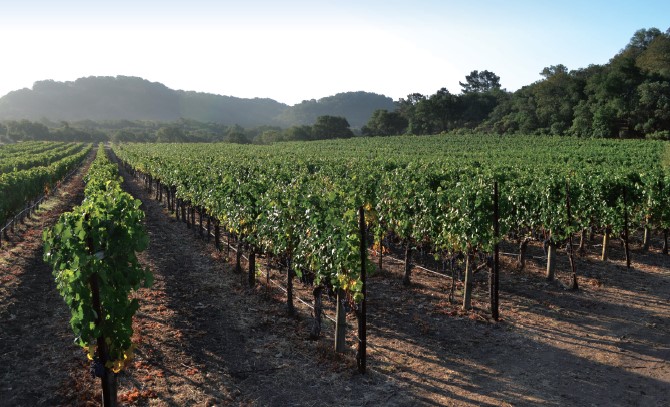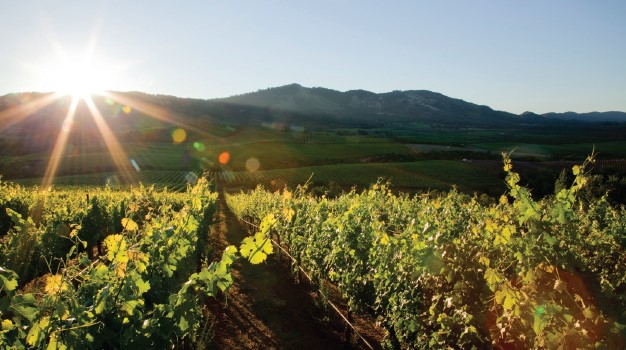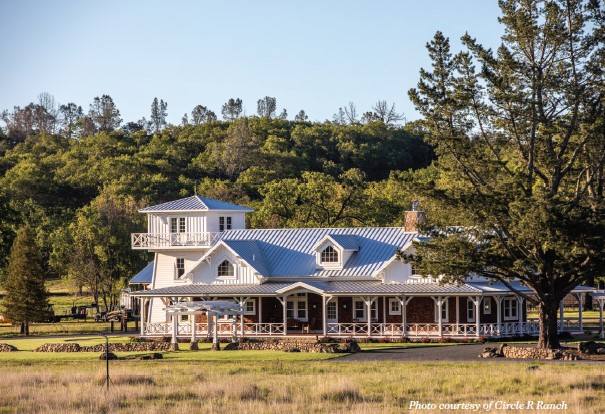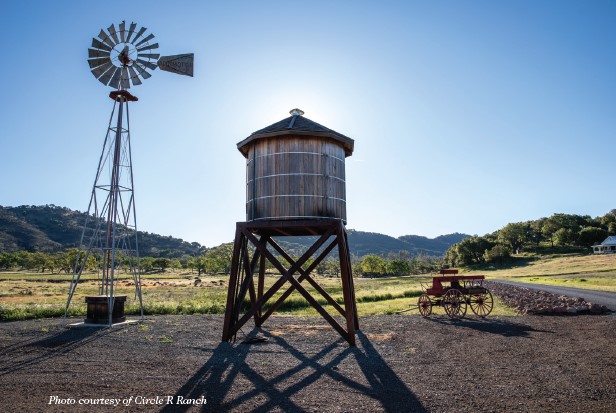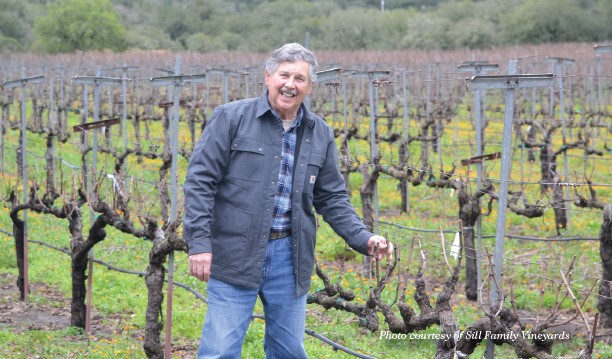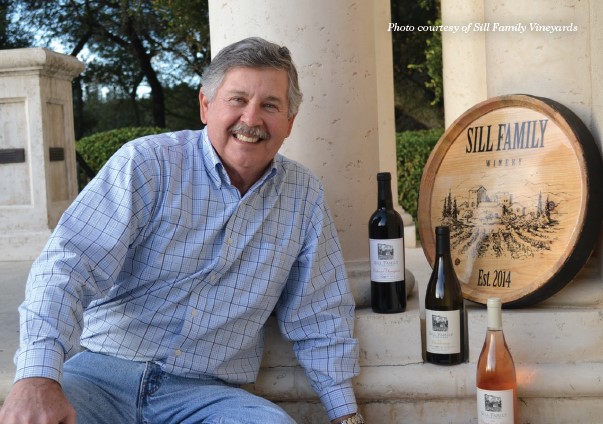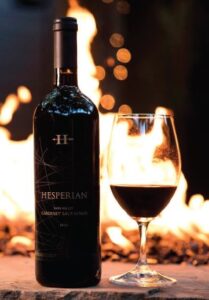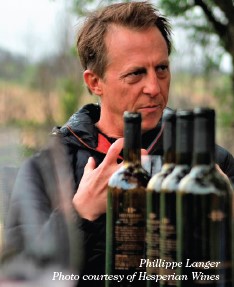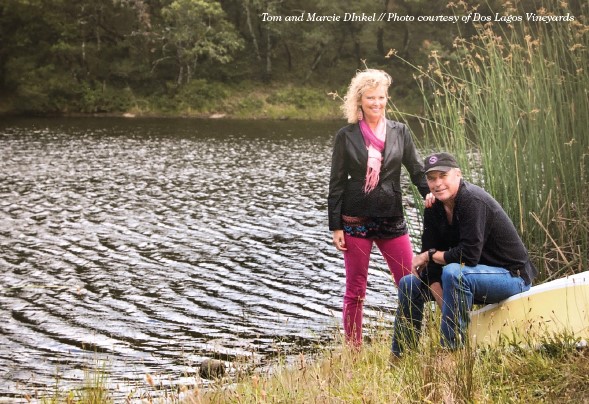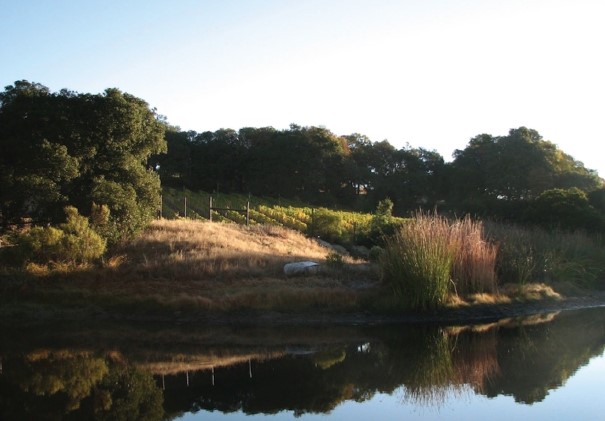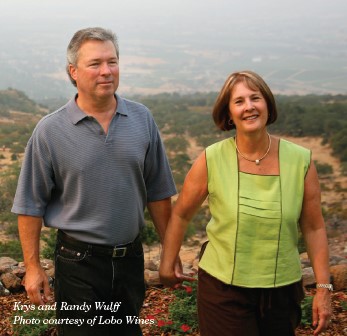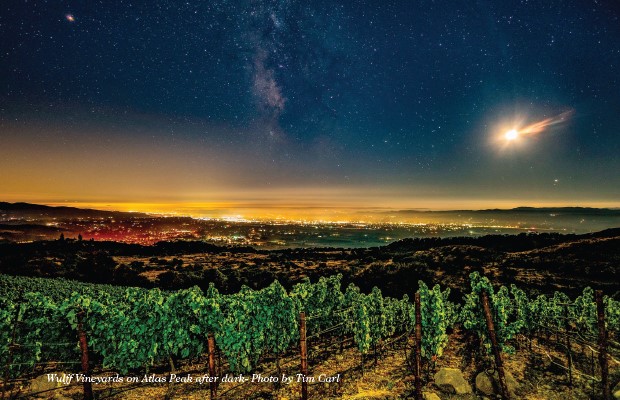Located at 2,663 feet on the western slopes of the Vaca Range separating the Napa and Sacramento valleys, Atlas Peak is known for acclaimed wines that are considerably different from those produced within the valley floor.
The region’s micronutrient-rich volcanic soils combine with high altitude, San Francisco Bay-cleansed air to produce bold fruit with outstanding red-fruit characteristics. The result Intensely flavored yet delicate and well-balanced wines of complexity and depth. To enjoy an Atlas Peak-derived wine is to instantly recognize its unique qualities, typically branded by bold structure and velvet silkiness. To enjoy an Atlas Peak wine is also to innately celebrate this region’s fortitude.
Having survived more than its share of natural disasters (several of the region’s wineries sustained devastating damage in the 2017 and 2020 wildfires), Atlas Peak and its valiant vintners are the very definition of resilience. Those who have chosen the somewhat wild and rustic region as their vineyard homes have dedicated themselves not only to quality fruit and award-winning wines but also to the protection and preservation of the bucolic terrain.
CIRCLE R RANCH
Leading the efforts to steward not only his own 1,600 Atlas Peak acres but also the acreage surrounding his Circle R Ranch is Peter Read. The former CEO of Grocery Outlet Bargain Market purchased his ranch land in 2015 with a somewhat atypical goal for prime Napa Valley real estate – to safeguard the area’s natural wildlife via a master plan created in collaboration with the Land Trust of Napa County.
Read’s verdant meadow now serves to function as a natural animal corridor that links with adjacent protected spaces, such as the nearby 1,318-acre Mead Ranch and 1,380-acre Sutro Ranch. He is adamant that the land be protected in perpetuity; ranchettes or other subdivision-like buildings will never be built on the property. Atlas Peak has historically served as a stronghold for biodiversity, inhabited by endangered owls, red-tailed hawks, and falcons, as well as bats, golden eagles, foxes, lynxes, and more than 150 native plant species. New motion-activated cameras on Read’s Circle R Ranch property have captured images of black bears, mountain lions, bobcats, and wild pigs.
The self-effacing Read (who describes himself as having led two very different lives, one as a ‘humble grocer’ and the other as a naturalist and vintage car enthusiast) has a rich philanthropic family history. With a warm heart and a clear vision in realizing his dreams, he is a major supporter of Marin County’s Marine Mammal Center, Walnut Creek’s Lindsay Wildlife Experience, and the San Francisco SPCA. Read also helped create the Carol Ann Read Breast Health Center at Sutter Health’s Alta Bates Summit Medical Center in Oakland in honor of his late wife. And, he has restored Circle R Ranch to reflect Atlas Peak’s natural beauty.
“We are fortunate to have such a compassionate neighbor and steward amongst us in Atlas Peak,” said Igor Sill of award-winning Sill Family Vineyards. “Peter is a prime example of a modern-day renaissance gentleman, an intellectual deeply concerned with preserving nature’s presence on our mountain. He always displays a genuine competence in and understanding of multiple fields, all of which complement one another to make him an incredibly gifted and charming individual. He is humble and never claims he can accomplish everything he dreams of, but he certainly seems to accomplish everything to which he commits his time and energy. He is someone who has a clear vision and applies his time to realize his dreams.”
Operated initially as a cattle ranch before the end of the Civil War, Circle R Ranch was once a homestead – a model that Read seeks to emulate. His goal is to recreate what it once was nearly 150 years ago. He has under-grounded power poles and utilities, rebuilt and refurbished a barn, and added cedar water tanks and a windmill. He’s also actively working on fire mitigation strategies to the great appreciation of his neighboring vintners. “I’m very appreciative of Peter’s efforts,” said Randy Wulff of LOBO Wines. “He has breathed new energy into the appellation and mobilized us to fund a new fire tower to be able to spot fires very rapidly in the future.” Added Tom Dinkel of Dos Lagos Vineyards, “Peter has taken a leadership role in fire mitigation, and we welcome and embrace his approach, having been singed in both 2017 and 2020. Doing something meaningful to mitigate fire damage is key to the survival of Atlas Peak as a growing area; the FireWatch camera is key to nipping the little fires before they become firestorms. Peter has been a great addition to our neighborhood. His professional approach to everything he does is wonderful.”
Despite his commitment to conservation and preservation with a master plan that included extinguishing vineyard development rights on nearly 89 acres, Read concedes that wine and grapes are the keys to sustainability. Roughly 75 Circle R Ranch acres are allotted for vineyard planting, the product of which Read hopes will allow the property to support itself over time. He has hired vineyard manager Mike Wolf to oversee the vineyard planted primarily to Cabernet Sauvignon grapes that he plans to sell to local Napa wineries. “Ideally, the grapes and the wine will carry the program,” said Read. “We hope to eventually break even, using the wine as a means to an end.”
The prospects for such a successful equation look good. Atlas Peak-derived wines are known for their purity and brilliant expressiveness and can be found on the wine lists of some of the nation’s most revered restaurants.
SILL FAMILY VINEYARDS
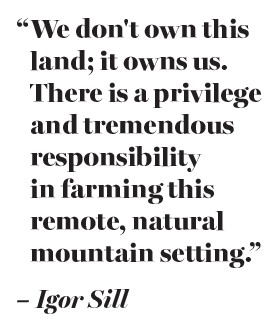 “Proof of the quality of our wines are the establishments that serve them,” said Sill of his Sill Family Vineyards varietals that have received various accolades such as a 97 point rating from Robert Parker for his 2007 Cabernet Sauvignon and a CWSA 2018 Wine of the Year award for his 2015 Cab. “Our wines can be found at The French Laundry, Solage Resort, San Ysidro Ranch, and Oakville Grocery, among other notable places. Of course, there is little that separates a good wine from an extraordinarily great one, but to a wine lover, there’s a world of difference between the two, and Atlas Peak often makes that difference.”
“Proof of the quality of our wines are the establishments that serve them,” said Sill of his Sill Family Vineyards varietals that have received various accolades such as a 97 point rating from Robert Parker for his 2007 Cabernet Sauvignon and a CWSA 2018 Wine of the Year award for his 2015 Cab. “Our wines can be found at The French Laundry, Solage Resort, San Ysidro Ranch, and Oakville Grocery, among other notable places. Of course, there is little that separates a good wine from an extraordinarily great one, but to a wine lover, there’s a world of difference between the two, and Atlas Peak often makes that difference.”
Sill can’t imagine establishing his winery anywhere else in the valley. The former private equity investor has been growing grapes, crafting wine, and living atop his Atlas Peak property for nearly a dozen years, and he continues to marvel at the region’s natural beauty and quality grape yield. His vineyard represents a unique piece of winemaking history. “It was one of the most difficult to plant and hardest to farm, but its quality is undeniable,” said Sill. “Farming my vineyard has broadened my mind and opened my heart. There’s a bit of divine intervention in this little pocket of heaven that creates magic.”
HESPERIAN WINES
“I think the thing that sets Atlas Peak apart from the other appellations in Napa is the sheer amount of rock we have up here,” said Philippe Langner, winemaker, master viticulturist, and CEO of 2004-founded Hesperian Wines. Despite a peripatetic life in Central America, South Asia, South America, Africa, and Europe, Langner selected Napa, specifically Atlas Peak, as his winemaking home. His interest in wine was sparked while interning for several years at the Rothschild-owned Chateau Clarke in Listrac, France, where he worked with consultants Jacques Boissenot and Michel Rolland. A self-described ‘one man show,’ Langner grows and makes 100% Cabernet Sauvignon, producing approximately 800 cases annually. “The topsoil is very thin, and you very rapidly hit rock. My vineyard sees the Bay and San Francisco on a clear day. That means there is always wind up here, and it is very strong at times. This stresses the vines, creating smaller berries and thus more intense wines. The cool bay air also refreshes the vines in the summer, and it tempers the temperature during the warmer parts of the day.”
Langner said the high quality of his Hesperian wines is due to the vineyard. “I work harder in the vineyard than the winery, so I can use simple winemaking techniques to let the wine shine on its own. So I farm for the highest quality wine and not for dollars by the acre.” Next year, Langner will start digging a cave on his property to craft his wines on site. “Apart from fires, it is a real pleasure to live up here. It’s a beautiful and wild place, and yet I’m only 15 minutes from downtown Napa.”
DOS LAGOS VINEYARDS
Tom and Marcie Dinkel created their Dos Lagos Vineyards on Atlas Peak in 2006.
With 22 acres, five of which are planted to Cabernet Sauvignon, they solely grow Cabernet Sauvignon to produce a 100% estate-grown Cab. “No mixing and no blending,” clarified Tom.
Their first winemaker was Robert Foley, who wanted to buy fruit specifically from Atlas Peak. His specifications were ‘at altitude, in white volcanic ash, Cabernet Sauvignon.’ “Kinda specific,” said Tom. “We worked with him (selling him fruit for his own label(s) and him making our wine) thru the 2015 vintage until we gave the reigns to Kent Jarman for the 2016 and beyond vintages.”
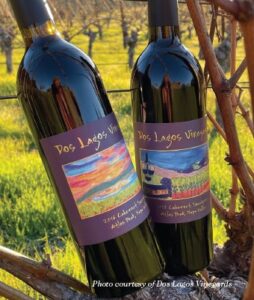 Tom admitted he and Marcie were a bit apprehensive about changing horses in the middle of the stream, so to speak, and particularly after having their 2015 Dos Lagos Cabernet Sauvignon compared to Bond, Harlan, Screaming Eagle, Dominus, and Opus One. They wondered if their wine quality was due to the winemaker or the vineyards – but given the exemplary skills of both of their winemakers, they concluded that it was likely a bit of both—the winemaker and the terroir that contributed to their stellar wines.
Tom admitted he and Marcie were a bit apprehensive about changing horses in the middle of the stream, so to speak, and particularly after having their 2015 Dos Lagos Cabernet Sauvignon compared to Bond, Harlan, Screaming Eagle, Dominus, and Opus One. They wondered if their wine quality was due to the winemaker or the vineyards – but given the exemplary skills of both of their winemakers, they concluded that it was likely a bit of both—the winemaker and the terroir that contributed to their stellar wines.
“Our vineyard terroir is one of the absolute key elements in our wine’s characteristic taste and flavor,” said Tom. “Our soils are unique, the altitude is unique, and our exposure is unique – somewhat similar to other Atlas Peak vineyards but different due to our volcanic ash. We believe that our soils contribute to a wonderfully balanced, nuanced, and layered wine that does not need anything other than our own fruit. Pretty amazing from a high altitude mountain vineyard – you’d expect that the wines would be much too powerful to bottle by themselves without a blending wine to smooth things out.”
The Dinkel’s also embrace the sustainable mantra of Atlas Peak. “Nothing goes onto the vines that will harm a bee or injure a tadpole or fish in our lakes. And specifically, no glyphosate!” These marching orders helped clarify the mission for highly acclaimed vineyard manager Hector Lopez who tends the Dos Lagos Vineyards.
LOBO WINES
Yet another acclaimed Atlas Peak label is Wulff’s LOBO Wines. Meaning ‘wolf’ in Spanish, the moniker is a playful wink to its founders’ surname as well as an homage to the Valley’s revered Hispanic workforce. Founded in 2005 by Randy and his wife Krys (the duo initially sold their fruit to other high-end wineries), they purchased their 42-acre dream property high atop Atlas Peak, intending to establish their own label. “The conditions were perfect for classic rocky, volcanic hillside Cab, so we planted what we could with Cab and a little Merlot and Petit Verdot for blending,” said Randy. The first LOBO label was a Pinot Noir in 2007, followed in 2008 by a Cabernet Sauvignon made by winemaker Victoria Coleman. “Victoria had just finished her oenology degree at UC Davis and an internship at Chateau Mouton Rothschild. We hired her the moment she returned from France, and we are now working on our 15th vintage together. We share the same passion, and we spare nothing to produce simply the finest ultra-premium wines.”
The Wulff’s winemaking philosophy has never wavered. With mantras of ‘balance’ and ‘complexity,’ they make Rosé of Pinot Noir in the crisp, Provencal style, as well as Pinot Noir, Chardonnay, Merlot, and a Proprietary blend of Syrah, Cab, and Merlot called “Howl,” all with 100% estate-grown fruit. Yet, they consider their Atlas Peak Cabernet Sauvignon their flagship wine. “Victoria would say it is the most challenging wine to make, with different lots all ripening at different times, but so worth it,” said Randy, who describes their vines as close row planted so that they struggle with the rocky soil to produce less yield, yet wonderfully extracted flavors. Their winery, The Caves at Soda Canyon, features dramatic, mountain top views overlooking Stags Leap.
Just as Peter is devoted to his Circle R Ranch, the vintners of Atlas Peak have also found a life-defining passion – to protect and regenerate the gifts of nature. Sill said, “We don’t own this land; it owns us, and I don’t say that lightly. I appreciate that we are only the most recent stewards in its long history. There is a privilege and tremendous responsibility in farming this remote, natural mountain setting.”
Story By: Fran Miller

